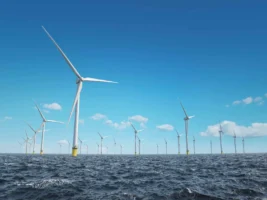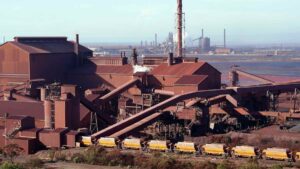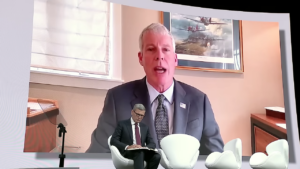Federal Coalition MPs voted on Tuesday to support the National Energy Guarantee that proposes to ensure no new investment in large-scale wind, solar or battery storage for nearly a decade, and also expressed their support for a new government initiative they hope will support new coal-fired generation.
A two-and-a-half hour meeting of Coalition MPs in Canberra produced the result that prime minister Malcolm Turnbull and energy and environment minister Josh Frydenberg had been hoping for: support for the NEG, despite opposition from former PM Tony Abbott and former deputy PM Barnaby Joyce.
Party room support had been certain after a separate meeting on Monday night convinced the majority of the backbench committee on climate and energy – led by the noisy Craig Kelly – to also support the NEG.
That meeting and the meeting of Coalition MPs on Tuesday embraced the promise by the Energy Security Board that the NEG – at its current emission reduction target – would ensure there would be zero investment in new large-scale wind, large-scale solar or large-scale battery storage from 2022 to 2030.
That unprecedented investment drought will take Australia from one of the leading countries in the adoption of renewable energy to bottom of the pile, according to analysis from ANU researchers.
The ESB has promised that this investment drought will be accompanied by bill reductions of $150 – delivered by bizarre claim of reduced capital costs for new investment the modelling shows they intend to stop happening.
The Greens pushed for the reasoning behind this bizarre piece of modelling to be released, and got the Senate’s support on Monday.
But the government simply re-released the XCel spreadsheet released a week earlier, sparking outrage from independent analysts, and astonishment from the states, including ACT climate minister Shane Rattenbury.
BREAKING: Gov has just released under Senate order their ‘full’ modelling behind the #NEG & its wild claims about $550/yr power bill cuts.
It’s a single Excel spreadsheet. That’s it. https://t.co/Uxa5BqgTG8
— Shane Rattenbury MLA (@ShaneRattenbury) August 13, 2018
The Coalition move to support the NEG is a remarkable victory for the Abbott forces.
Even though Abbott has shifted further right, and wants the renewable energy target (which is delivering most of the claimed cost reductions from the NEG) to be scrapped immediately, and for Australia to quit the Paris target, the NEG delivers more than Abbott could ever have contemplated.
It promises no new investment in renewables or battery storage, allows only for the Turnbull pet project of Snowy 2.0 – even though this has yet to establish its engineering, economic and environmental credentials – and leaves open the creation of a new coal-fired generator.
Turnbull told media on Tuesday that the government would also pursue the ACCC recommendation to underwrite new “dispatchable” capacity – a move the Coalition hopes will result in a new coal fired generator.
As if on cue, one of the units at the Loy Yang A brown coal generator in Victoria failed (during the Coalition backbench meeting with Frydenberg and the ESB), underlining the fragility of the country’s ageing coal generators.
proving that even brown coal generators have a sense of irony, a unit at victoria’s loy yang A failed just as the coalition’s backbench energy committee meeting got underway last night. #auspol #monash5 #coalfail pic.twitter.com/kexQR3uyHV
— simon holmes à court (@simonahac) August 13, 2018
While most analysts laugh at the prospect of new coal generation, the auction of capacity could be framed in such a way that it would favour coal over other technologies – such as the requirement for longer term storage, or what Turnbull described on Tuesday as the “need for baseload”, borrowing a favourite expression from Abbott and Kelly.
“A HELE plant would meet that description,” Turnbull said in response to a question from a journalist about whether “clean coal” would be able to compete.
Clean coal, is nothing but a marketing tool, because it does not exist. HELE ostensibly stands for “high efficiency, low emissions”, but compared to renewables and storage it should translate as “high emissions, low efficiency.”
A coal plant would also not meet AEMO’s demand for “flexibility”, because such plants do not like to be switched off. But in the past six months, the energy debate has been turned on its head, or – in the words of Labor’s Mark Butler – dialled back to the 1950s.
Professor Ian Lowe, emiritus professors of science, technology and society at Griffith University, said the NEG’s most serious deficiency is its failure to meet “even our legal requirements” under the Paris agreement to slow climate change.
“Since the government has no plan at all to reduce our greenhouse gas emissions from transport, agriculture or manufacturing, the lion’s share of our agreed reductions must come from electricity generation.
“The NEG’s target is totally inadequate. Modelling suggests that the current wave of investment in large-scale renewable energy generation will be stalled if the NEG is approved in its present form.
“The best way to give security of supply and lower prices would be to encourage more rapid development of large-scale solar and wind with storage. A new coal-fired power station would be financially irresponsible as well as being incompatible with our Paris obligations, which really require the rapid phasing out of existing fossil fuel generation.”
It is not yet clear whether the Coalition will implement the ACCC recommendations as part of an entire package, as urged by the ACCC chair Rod Sims. If so, that would result in the abolition of rebates for rooftop solar, including for farmers and other businesses that may be seeking to reduce their electricity costs.
The media huddle after the Coalition party room meeting also bore witness from another litany of misleading statements from Frydenberg and Turnbull, particularly in relating to claimed bill reductions (most comes from the RET), and the fall in wholesale market futures price (ditto, it’s the new wind and solar capacity doing that).
Because of Abbott’s extreme positioning, the NEG is being parlayed as occupying some sort of middle ground, such is the shift to the right in the current climate and energy debate.
Turnbull is now adopting Abbott’s language. He promised that if Labor wanted to argue for higher emissions in the next election, he would “welcome that argument” but he and LNP would take position it will raise electricity bills. So much for a bipartisan solution to climate and energy.
Supporters of the NEG have argued, behind closed doors, that the design is really about seeking agreement and can easily be ratcheted up. Trust us, they say.
But these are the same groups who have lobbied against the carbon price, the RET, against demand management and energy efficiency schemes, and against the 5-minute settlement rule. In short, anything that threatens the incumbent industry.
And have no doubt – this is a victory for the incumbents. Turnbull belled the cat on that and Bluescope did the same earlier in the day when it signalled it would fight any higher emissions targets, with its CEO saying Labor’s 45 per cent reduction would be impossible to meet.
Most analysis, apart from the discredited ESB modelling, suggests it will all be met by business-as-usual.
The incumbents are certainly happy. The ABC News 24 Channel interviewed Sarah McNamara, the head of the Energy Supply Council, which represents the energy incumbents. She could barely contain her joy, claiming that the policy delivered “certainty”.
McNamara, the ABC failed to point out, is the former government policy advisor to the country’s biggest coal generator AGL, a former senior climate and energy advisor to Abbott when he was PM, and policy advisor to Ian Macfarlane, the industry minister who now heads the Queensland Resources Council.
The ESC played a critical role with the ESB in designing the NEG.
The focus now shifts back to the states, and particularly Victoria, which faces its own state election poll later this year. It has insisted that approval will only be given to the mechanism if the emissions targets are flexible, and can be reviewed every three eyes, rather than locked in until 2030 as desired by Turnbull.
Frydenberg will talk to state energy ministers in a phone hook up this evening, with the legislation likely to be exposed in draft form – pending a final vote of states before Victoria goes into caretaker mode.
If it is approved, it then goes back to parliament, where the emissions component of the NEG will be voted on. At least five e members of the Coalition – Abbott, Eric Abetz, and others – have signalled they may cross the floor. Which then puts the emphasis on federal Labor to support the package or not.









